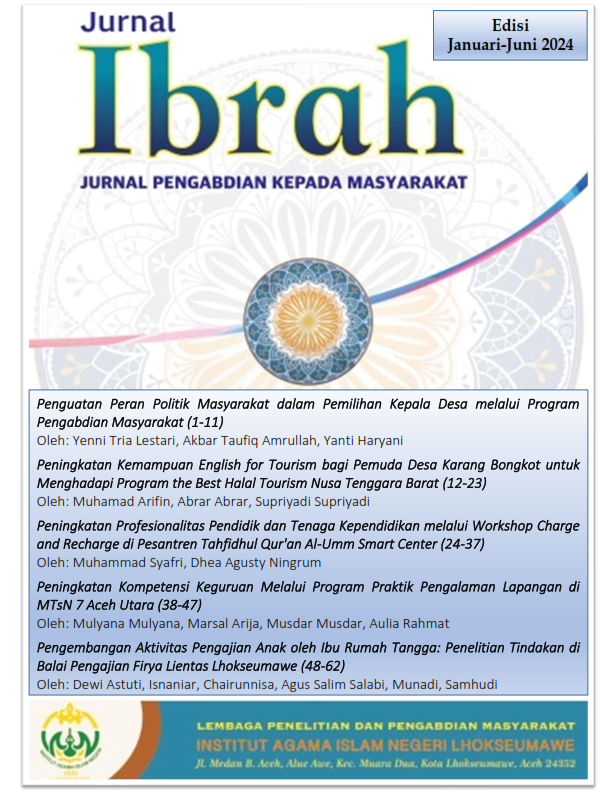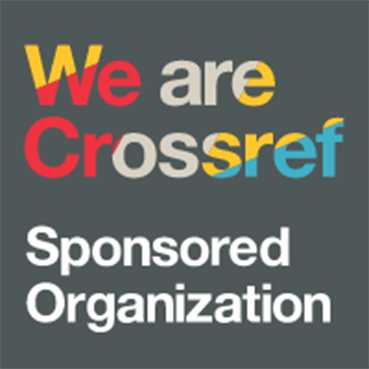Pengembangan Aktivitas Pengajian Anak oleh Ibu Rumah Tangga: Penelitian Tindakan di Balai Pengajian Firya Lientas Lhokseumawe
DOI:
https://doi.org/10.47766/ibrah.v3i1.2529Keywords:
Children's Religious Study, Recitation Hall, Roles of HousewivesAbstract
This study aims to explore and develop a learning program for children’s religious education at the Firya Lientas Housing Community in Lhokseumawe. The research employs an action research approach with qualitative methods to understand and enhance the effectiveness of the program. The methodology involves five main steps: problem identification, action planning, action implementation, observation and data collection, and reflection. Data were collected through participatory observation, in-depth interviews, and documentation. Data analysis was conducted using qualitative techniques, including transcription, coding, thematic development, and data interpretation. The results indicate that the development of religious education activities has had a positive impact, as evidenced by increased understanding of religious values and the development of social-emotional skills. The increased support from parents, demonstrated by their willingness to contribute financially to the program and the establishment of active communication for mutual support, also reflects the positive impact of these activities. The active involvement of housewives who serve as religious teachers (ustazah) in imparting religious values, developing social-emotional skills, providing moral support, and planning the children’s religious education activities has helped enhance understanding of religious values and social-emotional skills through the development of teaching materials, implementation of interactive learning strategies, and ongoing evaluation. Based on these findings, additional training and preparation are needed for housewives who serve as teachers (ustazah) to better equip them to competently support children’s education.
References
Andini, D. W. (2022). Differentiated Instruction: Solusi Pembelajaran dalam Keberagaman Siswa di Kelas Inklusif. Trihayu: Jurnal Pendidikan Ke-SD-An, 2(3). https://doi.org/10.30738/trihayu.v2i3.725.
Azhar, I. (2022). Meningkatkan Keterampilan Dasar Mengajar Guru untuk Implementasi Manajemen Kelas Yang Bermutu. Madinah: Jurnal Studi Islam, 9(2), 218–239. https://doi.org/10.58518/madinah.v9i2.1384.
Coghlan, D. (2019). Doing Action Research in Your Own Organization. Sage Publications Ltd.
Dasopang, M. D., & Lubis, A. H. (2021). Perempuan-Perempuan Tangguh Penjaga Nilai-nilai KeislamanAnak: Studi Daerah Minoritas Muslim. Kafa`ah: Journal of Gender Studies, 11(1), 83. https://doi.org/10.15548/jk.v11i1.353.
Daulay, H. H. P. (2019). Pendidikan Islam di Indonesia: Historis dan Eksistensinya. Prenada Media.
Deci, E. L., & Ryan, R. M. (2000). The “What” and “Why” of Goal Pursuits: Human Needs and the Self-Determination of Behavior. Psychological Inquiry, 11(4), 227–268. https://doi.org/10.1207/S15327965PLI1104_01.
Hayati, C. I. (2022). Peran Guru Balai Pengajian Ummi Gampong Aree Kecamatan Delima Kabupaten Pidie. Ibrah: Jurnal Pengabdian kepada Masyarakat, 1(1), 25-38. https://journal.iainlhokseumawe.ac.id/index.php/ibrah/article/view/549.
Idhar, I. (2023). Peran Ibu Rumah Tangga dalam Mewujudkan Pendidikan Akhlak Anak Usia Dini di Desa Soro. FASHLUNA, 4(1), 66–77. https://doi.org/10.47625/fashluna.v4i1.458.
Khodijah, N. (2014). Reflective Learning sebagai Pendekatan Alternatif dalam Meningkatkan Kualitas Pembelajaran dan Profesionalisme Guru Pendidikan Agama Islam. ISLAMICA: Jurnal Studi Keislaman, 6(1), 180. https://doi.org/10.15642/islamica.2011.6.1.180-189.
M. Syukri Azwar Lubis, H. S. H. (2021). Peranan Ibu sebagai Sekolah Pertama bagi Anak. JURNAL ILMU PENDIDIKAN, 2(1), 6–13. https://doi.org/10.32696/jip.v2i1.772.
McNiff, J., & Whitehead, J. (2011). All You Need to Know About Action Research. SAGE Publications.
Nolen, A. L., & Putten, J. Vander. (2007). Action Research in Education: Addressing Gaps in Ethical Principles and Practices. Educational Researcher, 36(7), 401–407. https://doi.org/10.3102/0013189X07309629.
Salabi, A. S., & Prasetyo, M. A. M. (2022). Organizational Culture of Sukma Bangsa Learning School ( Analytical Study of Learning Organization Primordial Value ). Sukma: Jurnal Pendidikan, 6(1), 91–110. https://doi.org/10.32533/06105.2022.
Stringer, E. T., & Aragón, A. O. (2020). Action Research. SAGE publications.
Syahrundin, H. (2021). Buku Ajar Evaluasi Pembelajaran. Eureka Media Aksara.
Widayati, T. (2018). Peran Orang Tua dalam Mendidik Anak Perempuan Perspektif Pendidikan Islam. UIN Raden Intan Lampung. http://repository.radenintan.ac.id/3864/.
Windarsih, C. A. (2016). Aplikasi Teori Umpan Balik (Feedback) dalam Pembelajaran Motorik pada Anak Usia Dini. Tunas Siliwangi: Jurnal Program Studi Pendidikan Guru PAUD STKIP Siliwangi Bandung, 2(1), 20-29. https://e-journal.stkipsiliwangi.ac.id/index.php/tunas-siliwangi/article/view/306.
Epstein, J. L. (2001). School, Family, and Community Partnerships: Preparing Educators Andimproving Schools. Westview Press.
Henderson, A. T., & Mapp, K. L. (2002). A New Wave of Evidence: The Impact of School; Family; and Community Connections on Student Achievement. National Center for Family & Community Connections with Schools.
Downloads
Published
Issue
Section
License
Copyright (c) 2024 Dewi Astuti, Chairunnisa, Isnaniar, Agus Salim Salabi, Munadi, Samhudi

This work is licensed under a Creative Commons Attribution-ShareAlike 4.0 International License.










